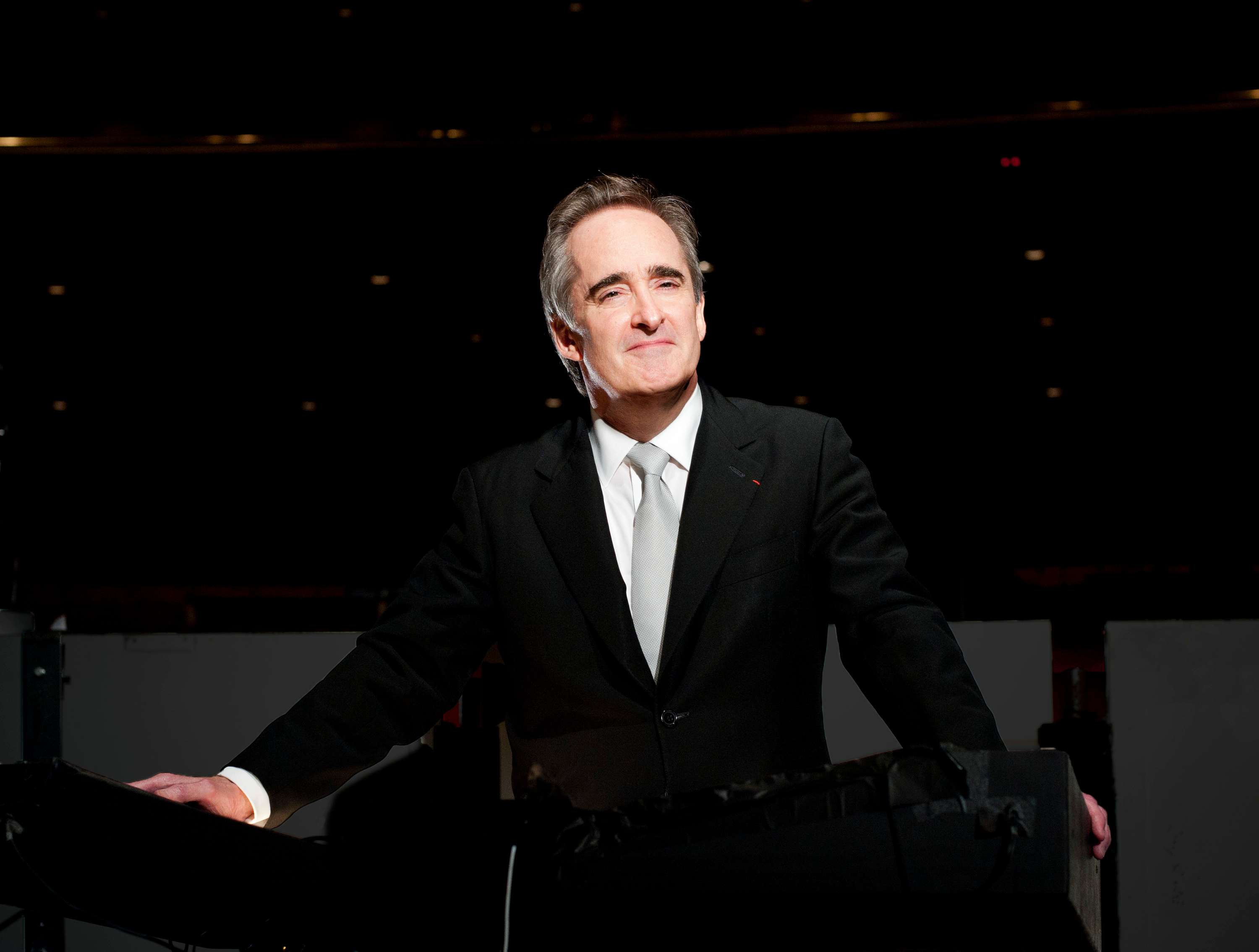|
Back
Requiems Mark May Festival Opening Weekend Cincinnati
Music Hall
05/10/2013 - & May 11*, 2013
Alexander Zemlinsky: Psalm 23, Op. 14 – Psalm 13, Op. 24
Wolfgang Amadeus Mozart: Requiem, K. 626
Benjamin Britten: War Requiem, Op. 66
Janai Brugger (soprano), Daniela Mack (mezzo-soprano), Richard Croft (tenor), Jordan Bisch (bass), Christine Brewer (soprano), Alek Shrader (tenor), Phillip Addis (baritone)
May Festival Chorus, Robert Porco (director), May Festival Youth Chorus, James Bagwell (director), Cincinnati Children’s Choir, Robyn Lana (director), Cincinnati Symphony Orchestra, James Conlon (conductor)

J. Conlon (© Dan Steinberg/LA Opera)
With the hall decked in flowers, young ballerinas dancing around a maypole, herald trumpeters signaling the curtain and tiny flower girls presenting bouquets to the soloists, the Cincinnati May Festival entered its 140th year May 10 with its traditions intact. On the podium was James Conlon, now entering his 34th year as May Festival music director (the longest tenure in May Festival history), who led with authority and deep conviction.
Opening weekend featured Mozart’s Requiem and the War Requiem by Benjamin Britten, a pair of masterworks that summoned the best from the considerable forces participating. These comprised the 143-voice May Festival Chorus, the Cincinnati Symphony Orchestra, the May Festival Youth Chorus (46 voices, joining the Chorus May 10) and the Cincinnati Children’s Choir (84 voices, May 11).
Conlon opened the festival May 10 with a pair of psalms by Alexander Zemlinsky, one of the Holocaust-era composers he has championed - indeed revived - during his career. Glints of harp, celesta and glockenspiel opened Psalm 23, which grew joyful and expansive on “Gutes und Barmherzigkeit werden mir folgen” (“Goodness and mercy shall follow me”). Psalm 13 (composed in 1935 with war clouds gathering) was agitated and insistent. “Wie lange soll sich mein Feind über mich erheben? (“How long will mine enemy be exalted over me?”) rose up through the Chorus, ending, however, with a declaration of faith, “Ich will dem Herren singen” (“I will sing unto the Lord”).
Mozart’s Requiem began whisper soft, with soprano Janai Brugger cutting brightly through the texture. Balances between the Chorus and CSO were excellent in the “Kyrie” and “Dies Irae,” and bass Jordan Bisch and Samuel Schlosser on tenor trombone excelled in the “Tuba Mirum.” The women voices answered the men’s stern “Confutatis maledictis” with soft plaints, leading into a heart-rending “Lacrimosa.” Following the stately “Sanctus,” tenor Richard Croft and mezzo Daniela Mack joined Brugger and Bisch in a gracious “Benedictus.” The Chorus’ collective breath was audible before the final cadence in “Lux Aeterna.”
Britten’s War Requiem holds a special place in the history of the May Festival Chorus, who performed it with Conlon and the CSO one month after 911 in New York’s Carnegie Hall. It is an ideal fit for 3,400-seat Music Hall. There were 320 singers and instrumentalists on stage May 11, plus the Children’s Choir and a portative organ in the gallery, which lent a transfixing spatial dimension to the performance. Composed in 1962 for the re-consecration of Coventry Cathedral (destroyed by bombs in World War II), it interleaves the Latin Mass for the Dead with war-themed poetry by Wilfred Owen. Tenor Alek Shrader and baritone Phillip Addis sang Owens’ verses, accompanied by a chamber ensemble. The liturgical texts were sung by the Chorus, the Children’s Choir and soprano Christine Brewer with the full orchestra.
A tolling bell, the Chorus’ forlorn “Requiem aeternam” and Shrader singing verses from Owens’ Anthem for Doomed Youth set the stark temper of the work, which is characterized by persistent unresolved harmonies. Soft fanfares built to a brassy clamor in “Dies Irae,” coupled with Owens’ “Bugles Sang” (untitled), sung by Addis. “Liber scriptus” with Brewer and the Chorus was answered by verses from Owens’ bitterly caustic The Next War, where Shrader and Addis sang gaily of their “old chum,” Death. Shrader’s “Move him into sun” and “was it for this the clay grew tall?” from Owen’s Futility, inserted between verses of the “Dies Irae,” were gut-wrenching, leading into “Pie Jesu,” where Britten allows a major chord resolution on “Amen.”
The pure, clear voices of the Children’s Choir, wafting down from the gallery, began the “Offertorium.” Shrader and Addis poured on the irony here with verses from Owen’s bitter Parable of the Old Man and the Young in which Abram ignores the angel and slays his son “and half the seed of Europe one by one.” The “Sanctus” glittered with metallic percussion, unsynchronized chanting by the Chorus and a brassy “Hosanna,” followed by a calm, composed “Benedictus” by Brewer and the Chorus. Addis’ “After the blast” from Owens’ The End ended flat and emotionless.
“Libera Me,” intoned softly by the Chorus, built to a tremendous climax, followed by verses from Owens’ “Strange Meeting” about a pair of former combatants (Shrader and Addis) who meet after death. All of the forces came together after “Let us sleep now” with a reconciliatory “In Paradisum,” sealed by “Requiescat in pace” and “Amen,” ending on a final, resolved major chord. Conlon paused a long moment before letting his hands fall to signal the applause.
Cincinnati May Festival
Mary Ellyn Hutton
|